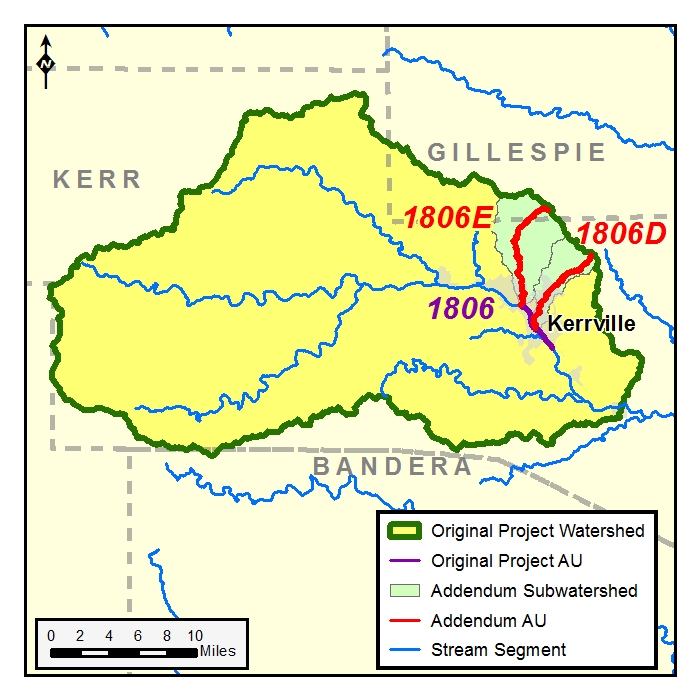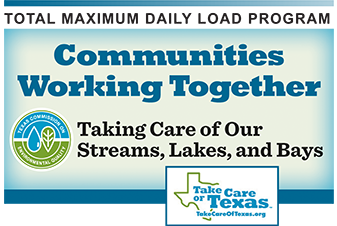Guadalupe River Above Canyon Lake
County: Kerr
Parameter: Bacteria
River Basin: Guadalupe
Segments: 1806, 1806D, 1806E
On this page:
- Background and Goal
- Watershed Description
- Get Involved
- Status
- Approved I-Plan
- Adopted TMDLs
- Reports
- Contact the TMDL Program
Background and Goal
The goal of this project is to reduce bacteria concentrations to protect the safety of recreational uses. High concentrations of fecal bacteria, which are naturally found in both human and animal waste, may indicate a health risk to people who swim or wade in the creek—activities called “contact recreation” in the Texas Surface Water Quality Standards.
Water quality testing conducted prior to 2006 indicated that concentrations of bacteria were sometimes too high in Segment 1806 of the Guadalupe River, the Guadalupe River above Canyon Lake. The areas of concern were confined to two small assessment areas within the city of Kerrville: (1) one mile upstream of Flat Rock Dam to a confluence with Camp Meeting Creek, and (2) from RR 394 to one mile downstream.
Assessment in 2014 indicated that the impaired portions of Segment 1806 are now fully supporting the contact recreation use. However, the tributaries Quinlan Creek (Segment 1806D) and Town Creek (Segment 1806E) were added for nonsupport of contact recreation in 2014. Since the adopted TMDL was for the entire watershed, the TMDLs for these two tributaries were added through an addendum in the state's Water Quality Management Plan.
Watershed Description
The watershed of the Guadalupe River Above Canyon Lake is a rocky, moderately dissected terrain fed by springs issuing from beds of limestone. The land is used for recreation, raising livestock, and small grain crops. During the drier months of summer, pumps are used to divert water for irrigation and domestic purposes. Base flow of the Upper Guadalupe River is sustained entirely by groundwater discharge, the main source of which is Edwards–Trinity aquifer.
This segment of Guadalupe River Above Canyon Lake is in south-central Texas. Its upstream end is the confluence of the North and South Forks of the Guadalupe River in Kerr County. Its downstream end is Canyon Reservoir in Comal County. Only a small part of Segment 1806, located within the City of Kerrville, is impaired for contact recreation—the Guadalupe River from its confluence with Town Creek downstream to Flat Rock Lake.
Get Involved
The TCEQ is working with the Upper Guadalupe River Authority (UGRA) to keep the public informed of project status. Find out more about what it means to participate in TMDL projects.
Partners
The organizations listed below are partners in improving water quality in the Guadalupe River Above Canyon Lake. All of the links in this section exit the TCEQ website.
Status

Bird deterrent net under a bridge over the Guadalupe River
Assessment in 2014 indicated that the impaired portions of Segment 1806 are now fully supporting the contact recreation use. However, the tributaries Quinlan Creek (Segment 1806D) and Town Creek (Segment 1806E) were added for nonsupport of contact recreation in 2014. Since the adopted TMDL was for the entire watershed, the TMDLs for these two tributaries were added through an addendum in the state's Water Quality Management Plan. In 2018, the stakeholders and the Upper Guadalupe River Authority prepared a revised I-Plan to continue their efforts in improving local water quality.
Approved I-Plan
On Aug. 31, 2011, the commission approved the plan to implement the TMDL for bacteria.
- I-Plan for One TMDL for Bacteria in the Guadalupe River above Canyon Lake, Segment 1806
- Response to Public Comment on the I-Plan
Revised Implementation Plan
In 2018, the stakeholders and the Upper Guadalupe River Authority prepared a revised I-Plan to continue their efforts in improving local water quality.
- 2018 Revised Implementation Plan for One TMDL for Bacteria in the Guadalupe River above Canyon Lake, Segment 1806
Status Reports
Tracking of implementation allows stakeholders to evaluate actions taken, identify actions that may not be working, and make changes as necessary.
- 2024 I-Plan Status Report
- 2023 I-Plan Status Report
- Bacteria Reduction Plan Year One Update presentation
- Upper Guadelupe River Authority’s Bacteria Reduction Plan : read the latest reports and updates from UGRA
- 2014 Guadalupe River Above Canyon Lake Success Story published by the U.S. Environmental Protection Agency
- Clean Rivers Program : various stakeholders have participated in the CRP to improve water quality in the Upper Guadelupe River
Adopted TMDLs
On July 25, 2007, the commission adopted the TMDL. EPA approved it in October 2007.
-
One TMDL for Bacteria in the Guadalupe River above Canyon Lake
Segment 1806 - Response to Public Comment on the TMDL
The EPA approved it on Sept. 25, 2007, at which time it became part of the state’s Water Quality Management Plan.
Revisions to TMDLs
From time to time, it is necessary to revise TMDLs to account for changing conditions in the watershed. Revisions to the load allocations in TMDLs are made via the state’s Water Quality Management Plan (WQMP), which is updated quarterly.
The WQMP provides projected effluent limits for use in planning and permitting activities under the Texas Pollutant Discharge Elimination System (TPDES). The TCEQ reviews all applications for new and amended permits for conformance with applicable portions of the WQMP, including adopted TMDLs.
Revisions are made to TMDLs in one of two ways:
- Updates are made to account for changing conditions in the watershed, such as new or revised wasteload allocations, permits that have been canceled or have expired, or changed facility names.
- Addenda are created to add load allocations for assessment units that are impaired by the same pollutant or condition, within the same watershed as in the original TMDL report.
Both updates and addendums are provided in the same units of measure used in the original TMDL.
Addenda
Additional TMDLs have been added for the watershed by addenda.
-
Addendum One: Two TMDLs for Bacteria in Quinlan Creek and Town Creek
Segments 1806D, 1806E. AUs 1806D_01, 1806E_01. Added via the January 2018 WQMP Update. Approved by EPA May 8, 2018 -
Addendum Two: One TMDL for Bacteria in Camp Meeting Creek
Segment 1806A. AU 1806A_01. Added via the April 2022 WQMP Update. Approved by EPA Aug. 11, 2022.
Updates
- July 2015, Appendix III, page 14
- January 2008, pages 12-13
For WQMP updates prior to 2014, use the TRAIL Search the TCEQ engine as outlined below. The main search box on the page will only conduct a simple search with no exclusionary parameters and should not be used.
- First, limit your search to TCEQ only. Do this via the advanced search feature on the left of the page. To limit a search to TCEQ content, enter “www.tceq.texas.gov” or “www.tceq.state.tx.us” into the “From the Host” search box.
- Refine your search to narrow down results. The other search boxes on the left of the page allow for search terms to be included, excluded, or used in an exact phrase search. Date ranges can be used as well.
Reports
- Technical Support Document for a TMDL for Camp Meeting Creek, AS-225, May 2022
- Technical Support Document for TMDLs for Quinlan Creek and Town Creek, 2017
Contact the TMDL Program
Please email tmdl@tceq.texas.gov, and mention the Guadalupe River bacteria project in the subject line. Or call us at 512-239-6682.






 Back to top
Back to top